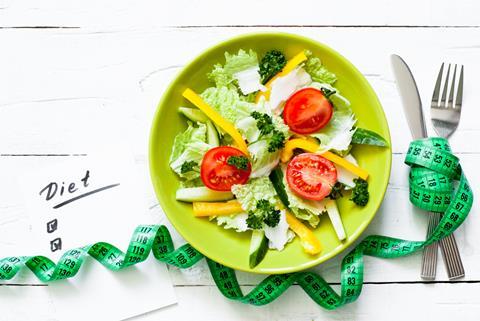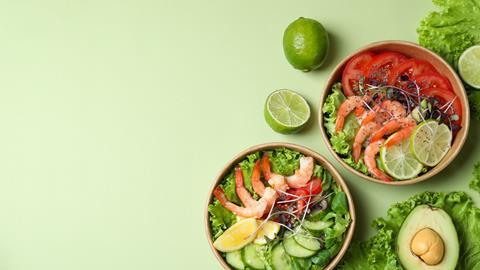In our new women’s health column, Dr Becky Howie shines a spotlight on diet culture, and emphasises the importance, instead, of food choice and nutrition based on the wisdom found in both science and scripture
It’s the start of a new year. Hands up those who have started a ‘diet’.
Does it feel like every January is Groundhog day? You commit to a diet, only to abandon it a few weeks later and revert to your previous eating habits.
Let’s not forget that there have been some unusual ‘diets’ over the years promising unbelievable results, like the boiled egg diet or the cabbage soup diet. Women seem to be particularly susceptible to the yo-yo dieting approach. It’s no surprise, given that so much of our self-worth and self-esteem is tied to cultural ideals regarding body size. This is especially true during our teen years, when beliefs about our value become deeply embedded in our psyche.
We are now entering a new era that is impacting our thoughts around size, self-esteem and dieting, largely due to the media frenzy surrounding new ‘weight loss injections’. As a doctor who specialises in lifestyle medicine, I want to emphasise that maintaining a healthy weight is crucial for our health and wellbeing. However, the focus on achieving a specific look or number on a scale drives diet culture, overshadowing the importance of eating well for health. Instead of nourishing our bodies and eating for health, longevity and energy we overly restrict and attempt punishing gruelling ‘diets’ that cannot be sustained.
Long-term healthy lifestyles
The question I am frequently asked is: “What is the best diet?” My answer is always the same: food choice and nutrition are key. Whatever approach you choose should be sustainable for the rest of your life. Instead of ‘going on a diet’, which implies a temporary commitment, we should focus on eating well to nourish our bodies in a way that promotes lifelong health. It’s about making a lifestyle change rather than simply following a diet.
One of the most studied dietary patterns in science is the Mediterranean diet (see box). This way of eating emphasises a plant-based diet that includes fruits, vegetables, nuts, seeds, herbs, spices, legumes, beans and pulses, as well as whole grains and healthy fats, while limiting red meat and processed foods. It allows for moderate amounts of dairy, poultry, eggs and seafood. What is particularly interesting about this way of eating is that the scientific community recognises it’s not just the food itself, but the traditional Mediterranean lifestyle that provides the best health benefits. This lifestyle promotes community, eating with others and taking time to enjoy meals. Families and communities gather and share fellowship around the table.

Biblical wisdom
Doesn’t this sound familiar? Throughout Jesus’ life, he prioritised eating with others and fostering fellowship and community. Over the years, as I have deepened my understanding of lifestyle medicine, I have been struck how science seems to be catching up with what the Bible teaches about how we should live. There is also a wealth of information about how we should eat. In Genesis 1:29, God tells Adam and Eve: “Look! I have given you every seed-bearing plant throughout the earth and all the fruit trees for your food” (NLT).
Later, in the book of Daniel, when Daniel refuses to eat the king’s food, he requests: “Give us nothing but vegetables to eat and water to drink” (Daniel 1:12). At the end of ten days, “they looked healthier and better nourished than any of the young men who ate the royal food” (Daniel 1:15). So, what do we do with this knowledge? In this case, science and the Bible align on how we should nourish ourselves to maintain energy and keep our bodies healthy.
I have been struck how science seems to be catching up with what the Bible teaches about how we should live
Unfortunately, many of us have started to lean on ultra-processed foods, which now make up about 57 per cent of the UK diet, and that can really take a toll on our health. By returning to the wholesome, nourishing foods God meant us to enjoy, we can take a big step toward feeling our best!
Treating your body well
I believe we should move away from ‘diets’ as we start the new year and embrace a different way of eating – one that is validated by both science and scripture. Choose real food over ultra-processed options, and include plenty of plants: fruits, vegetables, seeds, nuts, beans, pulses, herbs and spices. Consider the amazing variety of foods in nature that God has provided for us to enjoy. Rather than going ‘on a diet’, view this as a long-term way of eating – an enduring change rather than a temporary solution. As a result, you will likely feel better, lose weight if needed, and improve your energy levels and overall health.
As Baz Luhrmann said in one of my favourite songs (‘Everybody’s free [to wear sunscreen]’), your body “is the greatest instrument you will ever own”. Take care of it wisely and treat this incredible, God-given gift with the special attention it deserves. Fuel it with love and variety, and you will be better equipped to love others.

Key takeaways:
Focus on the Mediterranean diet
Inspired by the traditional diets of people living along the Mediterranean coast, the Mediterranean diet is simple, budget-friendly and reflects how many people on lower incomes used to eat. There are plenty of reasons why the Mediterranean diet is so popular to study in nutrition science. It has a long history, and researchers have found connections between this lifestyle and living longer, healthier lives. It’s about enjoying a variety of foods rather than following strict rules, which makes it easy to stick with.
Read more on the Mediterranean diet:
healthline.com/nutrition/5-studies-on-the-mediterranean-diet
healthy-diets/the-mediterranean-diet
Prioritise nourishing your body for lifelong health
The focus on BMI (Body Mass Index) in healthcare can be problematic. BMI doesn’t differentiate between muscle and fat and can vary based on age, sex, ethnicity and activity level too. That’s why organisations like the World Health Organisation (WHO) have suggested different BMI cut-offs for certain populations, like Asian communities, who may face health risks at lower BMI values. Ultimately, BMI fails to account for other important health factors, such as disease risk and overall wellbeing.
In order to understand and nurture our health it is best to focus on a range of health indicators. One useful measurement is the waist-to-hip ratio, which helps us understand where our bodies store fat. It’s important to note that having extra fat around the abdomen is linked to a higher risk of heart disease and type 2 diabetes.
Dr Becky Howie is a GP and lifestyle medicine doctor with a strong passion for women’s health. She is a trained coach and provides lifestyle guidance and life coaching through her practice, Maldod Life.
Follow on Insta at: @maldodlife

































No comments yet